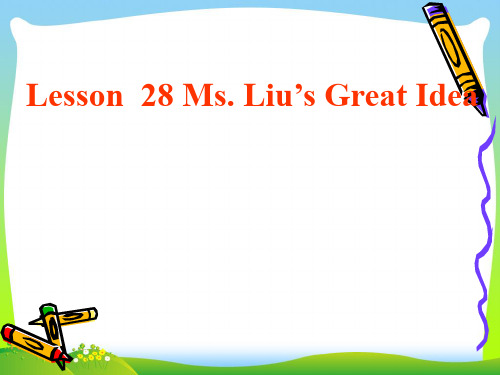八年级英语下册Lesson28教材内容详解冀教版
- 格式:doc
- 大小:117.50 KB
- 文档页数:7




冀教2011版八年级英语下册 Lesson 28 Ms. Liu’s Great Idea 教案及教学反思一、教案设计1. 教材分析本课教材来自冀教2011版八年级英语下册,第28课《Ms. Liu’s Great Idea》。
此课教材紧密贴合生活实际,通过让学生听录音、读课文、进行语音朗读、理解课文内容等环节,旨在培养学生综合语言运用能力。
2. 教学目标•知识目标:学会识别和理解课文中的重点单词和短语(fabric, recycle, lay out, be made from,protect…from…),掌握重点句型(It can be madefrom old clothes. New jackets can be made fromrecycled fabric.)。
•形式目标:培养学生交流和表达能力,鼓励学生自主提出问题并参与课堂讨论。
•情感目标:增进学生环保意识,培养学生对环保事业的积极态度。
3. 教学过程3.1 预习任务预习课文并总结课文中重点词汇短语和句型。
3.2 情境导入师生互动“环保”主题的图片,引入课文主题。
3.3 阅读理解1.师生合作,听录音并朗读课文。
2.向学生提问:•What does Ms. Liu do?•What is her idea?3.学生小组之间讨论问题并回答问题。
4.再次朗读课文,理解并掌握重要的词汇和句型。
3.4 个人操练1.学生阅读课文,并划出生词和重点短语。
2.学生个人练习语音朗读,并结合生词及短语进行阅读。
3.5 小组活动把物品摆在桌子上,要求学生在10分钟内讨论并表达出一种同样的物品可以通过使用废旧物品制成的新物品,并向全班汇报。
3.6 教学反思此课堂通过预习任务、情境导入、阅读理解、个人操练及小组活动等多种形式培养了学生的听说读写综合能力,尤其是在小组活动中,充分调动学生表达和交流的积极性,引导学生自主思考,培养学生合作精神。
然而,在课堂管理和授课过程中,要注意学生的情感态度,及时调整教学策略,降低学生学习的负面情绪,创造宽松愉悦的课堂气氛。

冀教版英语八班级下册课文原文及翻译中英对比版Lesson 28 Lesson 28 Ms. Liu's Great idea第28课刘老师的宏大想法One day, Ms. Liu received an email from Rose, her English friend.一天,刘老师收到了她的英国伴侣罗斯的邮件。
Rose just took a weekend trip with her husband to the countryside.罗斯刚刚和她的丈夫去郊区进行一次周末旅行。
She said they had a wonderful shopping experience.她说他们有了一次特别精彩的购物体验。
Along a small road, we saw a sign on a gate:沿着一条小路,我们在门口观察一个标识:"Fresh Eggs for Sale".“售卖新奇鸡蛋〞。
We parked the car and walked into the shop.我们停车走进商店。
No one was around.四周没有人。
Then I saw another sign: "Help Yourself!"然后我们观察另一个标识“请自助购置!〞On the table, there was a note:在桌子上,有一张便签:"Please take eggs from the baskets and leave your money in the box.“请把鸡蛋从篮子里拿出来,并把钱放进箱子里。
We appreciate your honesty!"我们对您的诚信表示感谢!〞We were surprised to find that the farmer was so trusting.我们特别惊异,这位农夫对人们如此信任。

Lesson 28: Fill My Plate装满我的盘子LET’S DO IT ! 做一做!Danny loves good food . Imagine that you want to invite him to have a meal in your home or in a restaurant. Make up a dialogue with a partner and act it out !丹尼喜欢美食。
假定你打算邀请他到你家里或餐馆里吃饭。
与你的搭档编写一段对话并表演一下。
●教材内容全解1. It’s time for lunch !现在是午饭时间!⑴It’s time for sth . = it’s time to do sth. 到了该做某事的时间了。
●—It’s time for school . = I t’s time to go to school .该上学了。
●—It’s time for the piano . = I t’s time to play the piano .该弹钢琴了。
⑵ lunch n. 午餐一日三餐前均不加冠词. have lunch 意为“吃午餐”。
●—On weekdays , what time do you have breakfast .2.Please fill my plate !With good hot food . 请将我的盘子盛满!用热腾腾的美食。
生词:plate n. 意为“盘子;碟子。
”on the plate 在盘子里in the bowl 在碗里●—There is a plate of fruit after meal . 饭后有道水果。
3. That tastes so great . 尝起来是那么可口。
生词:taste 的用法①vi . 作系动词,表示“尝起来”时,后接形容词或like 介词短语作表语。
Lesson 28: Fill My Plate装满我的盘子LET’S DO IT ! 做一做!Danny loves good food . Imagine that you want to invite him to have a meal in your home or in a restaurant. Make up a dialogue with a partner and act it out !丹尼喜欢美食。
假定你打算邀请他到你家里或餐馆里吃饭。
与你的搭档编写一段对话并表演一下。
●教材内容全解1. It’s time for lunch !现在是午饭时间!⑴It’s time for sth . = it’s time to do sth. 到了该做某事的时间了。
●—It’s time for school . = I t’s time to go to school .该上学了。
●—It’s time for the piano . = I t’s time to play the piano .该弹钢琴了。
⑵ lunch n. 午餐一日三餐前均不加冠词. have lunch 意为“吃午餐”。
●—On weekdays , what time do you have breakfast .2.Please fill my plate !With good hot food . 请将我的盘子盛满!用热腾腾的美食。
生词:plate n. 意为“盘子;碟子。
”on the plate 在盘子里in the bowl 在碗里●—There is a plate of fruit after meal . 饭后有道水果。
3. That tastes so great . 尝起来是那么可口。
生词:taste 的用法①vi . 作系动词,表示“尝起来”时,后接形容词或like 介词短语作表语。
●—The food tastes delicious ! 食物尝起来好极了!●—I t’s tastes sweet . 它尝起来有点甜。
②vt. 意为“尝,品尝;辨(味),尝出……味道”。
●—Can you taste anything strange in the soup ? 你尝出这汤里有什么怪味吗?③n. 意为“味道;滋味;少许尝的东西;一口;一点”。
●—I don’t like the taste of olives . 我不喜欢橄榄的味道。
4. And I will eat until my plate is empty . 我一直吃到盘子空空如也。
⑴生词:empty;①adj. 意为“空的”●—There is an empty box lying on the ground . 地上放着一个空匣子。
②v. 意为“倒空”。
●—He emptied the bottle . 他把瓶子倒空了。
●—I emptied out my pockets but could not find my keys .我把口袋里的东西都掏了出来,仍然找不到我的钥匙。
③an empty street 空无行人的街道an empty promise 空白的许诺empty out 把……腾空⑵语法:until 作连词或介词,意为“直到……”,引导时间状语从句或后接表时间的名词。
①until用于肯定句中,意为“直到……才;直到……为止”。
后跟一个具体的时间点,表示动作延续到until时间结束,用延续性动词。
●—We waited until he returned . 我们一直等到他回来。
●—He stayed there until it was dark . 他在那儿一直呆到天黑。
②until用于否定句中,固定短语为:not …until…意为“直到……才…...”“不到……不……”。
它表示主语的动作在某一时间或某一个动作之前未发生,谓语动词可以是延续的,也可以是非延续性的。
●—I didn’t finish my homework until 10 o’clock last night .昨天晚上,我直到10点才完成作业。
●—We won’t begin the meeting until he comes.直到他来,我们才能开始开会。
5.And my stomach’s full . 一直吃到我肚儿饱。
⑴生词:stomach n. 肚子,腹部;食欲,胃口have no stomach for …对……没胃口●—I often have a pain in my stomach after eating breakfast .吃过早饭后,我常常胃痛。
●—I’m full, I have no stomach for anything .我饱了,我对什么都没有食欲。
⑵full a. 意为“满的,装满的,充满的”。
Be full of = be filled with●—The box is full . 这箱子满了。
6.“Empty” is the opposite of “ full”. “空”是“满”的反义词。
生词:opposite adj. 表“相反的,相反的”;n. 表“对立面,相反的事物”。
①be opposite of●—There is a garden on the opposite side of the street . 在街的对面有一个花园。
●—Fast is the opposite of slow . 快是慢的反义词。
②opposite to●—He sat down opposite to me . 他坐在我的对面。
●—The hospital is opposite to the post office . 医院在邮局对面。
7. I love good food ! 我喜欢美食。
⑴ love n. & vt.①vt. 意为“爱,热爱;喜欢,爱好;愿意,希望”●—She loves nature . 她爱大自然。
●—He loves to bike . 他喜欢骑自行车。
●—I’d love you to come with me . 我希望你和我一起来。
②n. 意为“喜欢,爱;喜好,爱好”●—He has a strong love of adventure . 他极爱冒险。
●—The theater was her great love . 看戏是她最大的爱好。
⑵good在此句中为adj . (比较级:better 最高级:best)意为“好的,良好的,令人满意的”8. So why are n’t you sad when your plate is empty ?那么当你的盘子空时你为什么不悲伤呢?⑴so 意为“如此;这样”,表示结论,引起下文。
●—He said it again , so I could understand him . 他又说了一遍,所以我能理解。
●—It is very late . so you’d better do it tomorrow .天太晚了,因此你最好明天再做那件事。
⑵ sad adj.①悲伤的,难过的●—It makes me sad to hear you have to go away . 听到你非走不可,我觉得很伤心。
②很坏的,可耻的 a sad case of total callousness 一个十分无情的可耻的事例③暗色的,黑的●—The dark greenish colour grows sadder as the plant decays , till it approaches a black .那墨绿的颜色随着植物体的腐朽逐渐转暗直到几乎变在黑色。
⑶语法:这是一个否定疑问句,用来加强语气。
否定疑问句是用否定句开头的问句,意义中表“肯定”的强调或提问(提问的情况较少);回答时,肯定或否定句中的动词。
●—Can’t you remember what I told you ? 难道你不记得我对你说了什么吗?●—Why don’t you buy the useful book ? 你为什么不买下那本有用的书呢?●—Don’t you usually come to school by bike ?难道你平常不是骑自行车来学校吗?—Y es, I do . But I walk sometimes . 我平常是的,但是我有时也步行。
9. Imagine that you want to invite him to have a meal in your home or in a restaurant .假定你打算邀请他到你家里或餐馆里吃饭。
⑴ imagine vt.& vi.①vi .在本句中意为“猜测;假定;想象起来”。
当此意讲时,一般放在句首。
②vt. 意为“想象;设想;假想;猜想”。
●—We can hardly imagine life without electricity . 如果没有电,生活是不堪设想的。
③vt. 意为“料想;以为;认为”。
●—Tom imagines that people don’t like him . 汤姆认为没人喜欢他。
⑵ want to do sth. 打算做某事。
⑶invite vt. 意为“邀请;招待”①固定搭配:invite sb. to some place 意为“邀请某人去某地”。
●—Who should we invite to the party ? 我们应邀谁参加聚会?②固定搭配:inviet sb. to do sth. 意为“邀请某人做某事”。
●—I’m thinking of inviting them to spend the summer with me in Italy .我正考虑邀请他们和我一起在意大利过夏天。